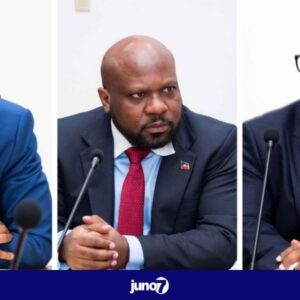Those who grew up in the 90s surely know Haytian Buju, whose real name is Robenson Lovius, the deep voice of the legendary group King Posse who was all the rage in the mid-90s and early 2000s. Absent from the music scene for many years many years, the one who was born on Christmas Eve in 1971, in Marchand Dessalines, father of four children and already grandfather of two grandchildren, opens up to Loop Haiti in this new release from the #KoteWYe section.
For music buffs who didn’t know, Haytian Buju is the son of Tropicana’s first maestro “Tiblan”, musician, singer, guitarist and composer Closeille Lovius, who worked on the album “Mize melere” by Tropicana. The Capois orchestra nicknamed “La Fusée d’Or”. Buju’s father was also a guitarist in Scorpio before joining Tropicana. Since 1990, the Haitian Buju has lived in the United States and has never married, but is currently engaged.
In this issue of #KoteWYe, Samy B’s friend, Black Alex and Buddha Rankswho put his powerful voice on hits like “Lokal”, “Sou do m”, or even “Men the boot”, tells us, among other things, what brought him into music, how he joined King Posse, and evokes the “controversy” between the checkered flag group and Original rap staff (ORS). Let’s discover together the beautiful story of Haytian Buju with King Posse.
Loop: Haytian Buju, we are happy to welcome you in our #KoteWYe section. Before talking about your adventure with King Posse, tell us what got you into music.
HB:I was born into a family that made music. From the cUmbrellaThanks to my father in particular, who was a musician in Scorpio before joining Tropicana where he worked on the album “Mize melere”, I was in contact with music quite early because my father was a musician who played several instruments. He was also a composer and promoter. Very early on, I knew I was going to make music and become a singer. Growing up, I always wanted to prove to my family that I was going to become an incredible musician.
Loop: From this love for music to your essential place in the legendary group King Posse, tell us how this love story began?
HB: My story with King Posse began in a special way. I was a great football player at my high school in New Jersey, but I had some behavioral problems. One day I drove a car without a license and the police arrested me. When my father-in-law who was on vacation heard the news, he was very angry and decided to send me to Haiti, keeping my identity documents with him.
Arriving in Haiti, I met an artist called Master Rod with whom we performed on school recreational days, from Pétion-Ville to Champs-de-Mars via Lalue. We earned between 2,500 and 3,500 gourdes per show and Master Rod gave me between 1,500 and 2,500 gourdes. At one point, I told myself that I wanted more than that. I already knew the late Black Alex with whom I performed with the Salesian Brothers. Fred Lizaire, who started hearing about us and who knew Buddha Ranks, asked us to form a group, telling us that he knows someone capable of producing an album with us, namely the late Yvon Ciné, who made King Posse the legendary musical group that we knows. This is how my story with King Posse began.
Loop: Your history with King Posse has surely left very good memories in you. What is the best memory you have of this legendary boys band from the 90s?
HB: (Smile). One of my fondest memories with King Posse was when we were all in a car with the windows filmed and we were telling each other what was going through us. We said to ourselves, look where we come from and where we are today, how we really managed to achieve what we didn’t even think was possible. Buddha Ranks used to tell us about the cars he drove overseas and we were in that kind of car in Haiti. It was incredible. We were so used to each other that we constantly had communication radios to talk to each other, when we didn’t meet at our “lokal” in Bourdon where we each had a bed, our refrigerator, everything we needed . There are so many memories, meetings, good times between us. These are truly unforgettable things.
Loop: We know that nothing works alone. With success, comes controversy with Original rap staff (ORS). How did you experience this controversy?
HB: Thiscontroversy don’t wenever really shocked because ORS wasn’t much of a rival. But in the houses, when we took out a carnival and they took one out after us, people talked about controversy. For our part, we took it as a group relying on us to move forward, despite the fact that they were there before us.
However, we met in the recording studio where the two groups recorded their songs, and each time there were never good memories, especially between Top Adlerman and me. But at a certain point, they started to take us for rivals, especially during carnival periods, when we focused on our message, our music. They thought it was their moment when we didn’t even want to share the stage with them so they wouldn’t think be in the same dimension as us. The only time we agreed to share the stage with them was, according to what I heard at the time, because their manager had offered extra money to our management team to we agree to share the stage with them. This only happened once. At the time, we weren’t really impressed because we knew they didn’t have hits that matched ours to be able to counter us.
Loop: A little more personal question now. At the time of King Posse you certainly made a living from music, but since the group is no longer active, what activity does Haytian Buju make a living from?
HB: At one time I worked in a parking lot in Manhattan, but I transferred almost everything I earned to Haiti, because my maternal grandfather was sick and I didn’t want to let him suffer for medicine. At that time, I was also undergoing treatment in the United States, although it did not last very long. That being said, I played often in the United States after King Posse disbanded. I was always playing playback with a DJ all over the United States. For a few years I had decided that I no longer wanted to continue doing this, so I sometimes invested my own money to release the few songs that I released after King Posse.
Loop: Speaking of personal productions, can we expect a product from Haytian Buju or should we wait for a return from King Posse to see that?
HB: If we talk about personal productions, yes, I am very motivated for that. The problem is that I don’t have a sponsor, I’m not in contact with promoters where I am in New York. Otherwise, it would have to be as part of a King Posse comeback, if there are people interested in the group’s return, because there are still Van Damme, Grégory, Oky James, Mackenson and my team, namely Samy B and Buddha Ranks, after the death of the other members of the group.
Loop: If you had to address your fans in particular and those of King Posse in general as a final word to this interview, what would Haytian Buju say to them?
HB: I want to ask forgiveness from the Haitian people, from the fans of Buju and King Posse. I want to apologize to Fred Lizaire for the comments I made about him. I kept his words because I was not yet healed from what I experienced, since I am a very sentimental person. I ask you to forgive me and I believe that Fred Lizaire will be happy to know that I am now healed and that this story is now a story in the past. We should never have to confront each other for everything we experienced together, everything we built together. I admit my wrong.
Finally, I thank you Allwitch for offering me this immense opportunity to speak to my audience, to ask their forgiveness and also to Fred. I hope that we will still have the opportunity to talk, and if it’s not me, it will be my son who is deeply into music as I speak to you.


